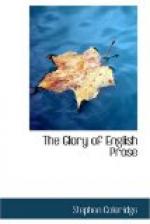The whole of the forty-fifth chapter is touching and beautiful beyond all criticism, transcending all art. To read it is to believe every word of it to be true, and to recognise the sublimity of such a relation.
No narrative of the great Greek writers reaches the heart so directly and poignantly as does this astonishing story. It moves swiftly and surely along from incident to incident till Joseph’s loving soul can contain itself no more:—
“Then Joseph could not
refrain himself before all of them that
stood by him; and he cried,
Cause every man to go out from me.
“And there stood no
man with him, while Joseph made himself known
unto his brethren.
“And he wept aloud:
and the Egyptians and the house of Pharaoh
heard.
“And Joseph said unto his brethren, I am Joseph; doth my father yet live? And he fell upon his brother Benjamin’s neck, and wept; and Benjamin wept upon his neck. Moreover he kissed all his brethren and wept upon them.
“And after that his brethren talked with him.”
And this wonderful chapter ends thus:—
“And they went up out
of Egypt, and came unto the land of Canaan
unto Jacob their father, and
told him, saying, Joseph is yet
alive, and is governor over
all the land of Egypt.
“And Jacob’s heart fainted, for he believed them not.
“And they told him all
the words of Joseph, which he had said unto
them: and when he saw
the wagons which Joseph had sent to carry
him, the spirit of Jacob their
father revived:
“And Israel said, It
is enough; Joseph my son is yet alive: I will
go and see him before I die.”
If you read the story of Joseph through from start to finish, you will see that it is a perfect narrative of the life of a man without fault, who suffered much but without resentment, was great of heart in evil days, and, when Fortune placed him in a position of glory and greatness, showed a stainless magnanimity and a brotherly love that nothing could abate. It is the first and most perfect story in literature of the nobility of man’s soul, and as such it must remain a treasured and priceless possession to the world’s end.
In the short Book of Ruth there lies embalmed in the finest English a very tender love story, set in all the sweet surroundings of the ripening corn, the gathered harvest, and the humble gleaners. Nothing can be more delightful than the direction of Boaz, the great land-owner, to his men, after he had espied Ruth in her beauty gleaning in his fields:—
“And when she was risen
up to glean, Boaz commanded his young men,
saying, Let her glean even
among the sheaves, and reproach her
not:
“And let fall also some
of the handfuls on purpose for her, and
leave them, that she may glean
them, and rebuke her not.”




